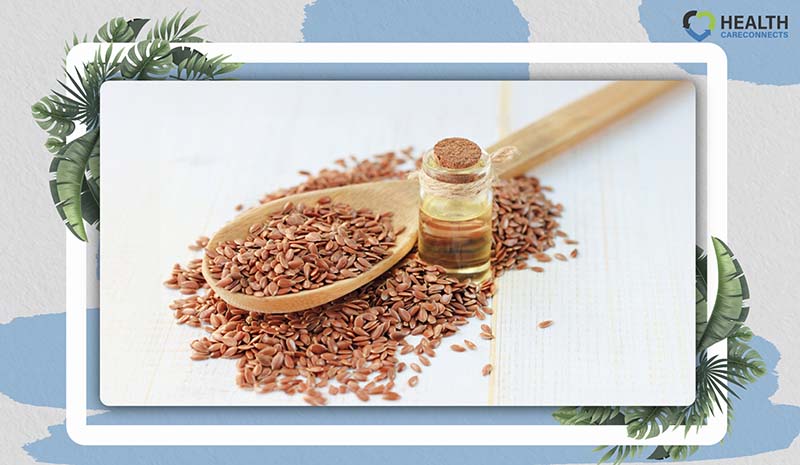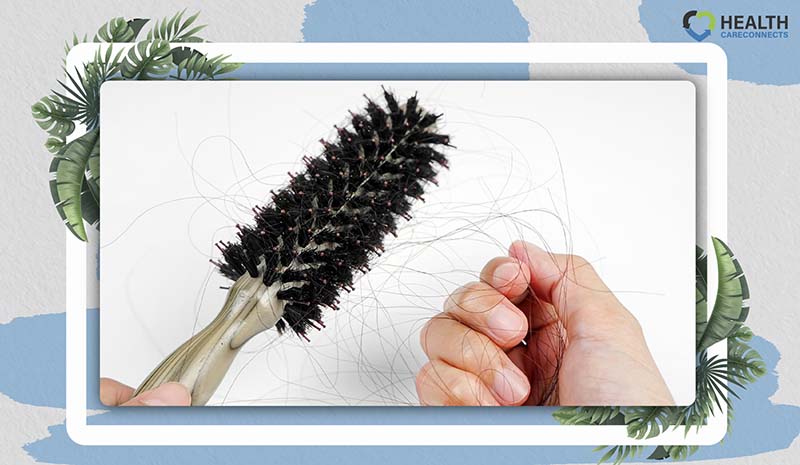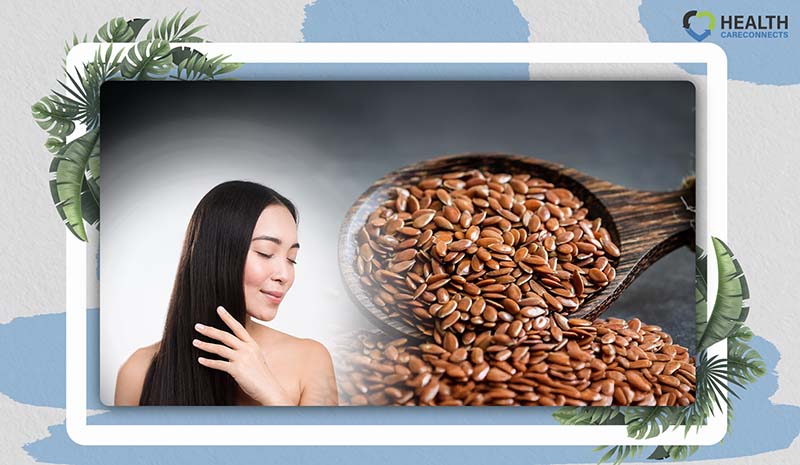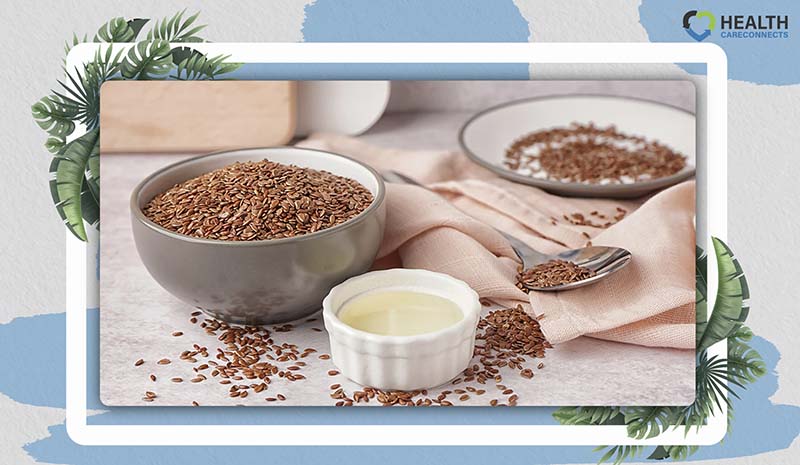Flax seeds, long celebrated for their nutritional and health benefits, are now gaining attention for their potential advantages for hair care.
Incorporating “flax seeds benefits for hair” into your routine, whether by applying flaxseed oil directly to your hair or incorporating ground flaxseed into your diet, is believed to enhance hair strength, promote growth, and improve manageability.
Though research specifically targeting flaxseed’s effects on hair is still emerging, the numerous health benefits of flaxseed oil and ground flaxseed are well-documented, suggesting promising outcomes for hair health as well.
Are Flaxseeds Good for Hair?
Flaxseeds are packed with nutrients that are great for hair health. They are rich in B vitamins, which help hair grow faster and stronger. They also contain omega-3 fatty acids, which are good for your heart and can reduce inflammation. This is especially useful for vegetarians who don’t eat fish.
You can use flaxseed oil on your hair or eat flaxseeds. When used on hair, the oil works like other plant-based oils, helping to seal the hair cuticle to prevent frizz and breakage. Flaxseeds also have vitamin E, which fights free radicals on the scalp, supports sebum production, and keeps your scalp healthy.

10 Benefits of Flax Seeds for Hair Growth
Flax seeds offer a multitude of benefits for promoting hair growth and overall hair health. Here are some of the key benefits:
Minimize Hair Loss
Flaxseed is renowned for its abundance of fatty acids and essential vitamins, making it a critical element in any hair care regimen.
Regular use of flaxseed can significantly bolster hair strength and diminish hair loss.

Nourishes All Hair Types
Flaxseed oil is rich in vitamin E and omega-3 fatty acids, delivering deep nourishment to your hair.
It promotes smooth, vibrant, and healthy strands, making it an excellent addition to your haircare routine.
Prevent Split Ends
Flax seeds enhance hair strength, drastically reducing breakage and preventing split ends. This leaves your hair looking healthy and resilient.

Restores Dry and Damaged Hair
Vitamin E in flaxseed is vital for combating hair damage. It fights free radicals and reduces scalp inflammation, adding shine and improving hair elasticity.
Enhances Hair Quality
Flaxseeds, with their rich content of omega-3 fatty acids and vitamin E, strengthen hair and prevent breakage. They also soothe scalp inflammation, supporting robust hair growth. Mixing flaxseed oil with blackseed oil can enhance these effects, offering optimal results.
Protect Your Hair
Regular use of flax seeds can shield your hair from environmental stressors, fortifying your strands and maintaining their health.

Moisturizes Curly Hair
Flaxseed’s essential nutrients deeply penetrate hair strands, providing thorough nourishment.
Incorporating flaxseed into your conditioners, growth oils, and anti-hair-fall shampoos will enhance the beauty of your locks.
Soothes Irritated Scalp
The omega-3 fatty acids in flaxseed alleviate scalp inflammation and sensitivity, balancing pH and oil production. This calming effect promotes the optimal health of sebaceous glands, ensuring they produce the right amount of sebum for healthy hair growth. Sesame oil can also benefit the hair similarly.
Promotes Hair Growth
Flaxseed supplies essential nutrients to the scalp, fostering healthy hair growth. Consistent use keeps scalp issues away and maintains proper hydration.
Prevent Dandruff
Flax seeds nurture the scalp and inhibit microbial growth that can cause dandruff. Including flaxseed in your haircare regime will not only promote shiny hair but also ensure a dandruff-free scalp.
Utilizing Flaxseed for Optimal Hair Growth
There are several methods to harness the hair-enhancing benefits of flaxseed, a nutrient-packed superfood. For topical application, opt for flaxseed oil rather than whole or crushed seeds.
Flaxseed oil is readily available in both the cooking oil aisle of your local grocery store and specialty wellness shops.
- Hair Mask: To use flaxseed as a hair mask, pour a small amount of the oil into your hands and massage it directly into your hair. Leave it on for up to 15 minutes, then rinse it out and shampoo as usual.
- Pre-Conditioning Rinse: Alternatively, you can use flaxseed as a pre-conditioning rinse after shampooing. Simply rinse the oil out of your hair before applying conditioner.
- Flaxseed Hair Gel: Another option is to make a gel out of flaxseed. Unlike a mask, flaxseed hair gel is designed to stay in your hair throughout the day until your next shampoo session.
- Nutritional Supplement: Flaxseed oil is also available in capsules as a nutritional supplement. However, it’s crucial to consult your doctor before taking any supplements, including flaxseed. Supplements may have adverse health effects. Some brands recommend taking up to six flaxseed capsules per day, but dosage may vary.
- Dietary Incorporation: Lastly, you can enjoy the benefits of flaxseed by incorporating crushed seeds into your diet. Add flaxseed to everyday meals such as oatmeal, salads, and grains for a nutty flavor.
Over time, your hair may become smoother and stronger, thanks to the fatty acids and antioxidants in flaxseed. However, like any “superfood,” flaxseed is best enjoyed as part of a balanced diet.

Potential Side Effects of Flaxseed Oil Usage
Even though flaxseed oil is a natural plant-based food source, it can still pose risks:
- Gastrointestinal Side Effects: Some individuals may experience gastrointestinal discomfort, including abdominal cramps, bloating, gas, diarrhea, or constipation.
- Toxicity Risks: Consuming unground or unripe flaxseeds can lead to toxicity.
- Decreased Blood Pressure: Flaxseed oil may lower blood pressure, which can be problematic for individuals with already low blood pressure levels.
- Potential Increased Risk of Prostate Cancer: There is some evidence suggesting a possible increased risk of prostate cancer associated with flaxseed consumption.
- Increased Estrogen Levels: Flaxseed contains phytoestrogens, which may elevate estrogen levels and could potentially have adverse effects on fetal development during pregnancy.
- Drug Interactions: Flaxseed oil may interact with certain medications, particularly blood thinners, cholesterol medications, and insulin used for diabetes management.
- Skin Sensitivity: Some individuals may experience skin sensitivity to topical oils, including flaxseed oil.
Additionally, while flaxseed oil is a good source of omega-3 fatty acids, it’s not the most efficient form. The omega-3s in flaxseed oil must be converted into DHA and EPA before the body can absorb them, resulting in only a fraction of the omega-3 benefits.
If you’re looking to increase your omega-3 intake, consuming fatty fish or taking fish oil supplements may be more effective options. Relying solely on flaxseed oil may not provide sufficient omega-3s for optimal health benefits.
Is Daily Application of Flaxseed Oil Safe for Hair?
The safety of daily flaxseed oil application for hair depends on individual needs and hair type. Overall, it can be used on your hair every day or as often as needed for best results.
Can Flaxseed Stop Hair Fall?
Flaxseed’s nourishing properties can certainly help strengthen hair strands and reduce breakage, potentially minimizing hair fall.
However, addressing the underlying causes of hair loss, such as nutritional deficiencies or hormonal imbalances, is crucial for achieving long-term results, as flax seeds can only help to a certain extent.
Conclusion
Flaxseed and flaxseed oil are excellent plant-based options that offer numerous health benefits and can be added to your daily meals. For topical application, flaxseed oil can be used on your hair to provide instant smoothness and conditioning. This is just one of the many “flax seeds benefits for hair” that can enhance your hair care routine.
Regardless of how you choose to use flaxseed, supplement it with other healthy hair care methods. This includes regular trims, consistent shampooing, and routine conditioning to maintain the overall health and vitality of your hair.
For those seeking more information and honest product reviews, I recommend visiting HealthCareConnect.

Dr. Joyce Slater: Your Guide to Informed Health Choices
Dr. Joyce Slater shines as a distinguished expert in the field of nutrition and public health. Contributing her vast expertise to HealthConnectbc, she embodies a deep-seated passion for enhancing public well-being. As a respected figure in her field. Dr. Slater’s academic journey and professional achievements are nothing short of inspirational.
Holding a significant position as a researcher and educator, Dr. Slater has delved deeply into the intricacies of food literacy and nutritional science. Her work, prominently featured in numerous esteemed scientific publications, underscores her dedication to expanding our understanding of food’s role in health and society.
At the heart of Dr. Slater’s professional ethos is a profound desire to positively impact individual lives through education and research. She often says, “Empowering people with the knowledge to make healthier choices is the most rewarding aspect of my work.” This principle is the cornerstone of her involvement with HealthConnectbc, where she strives to provide reliable and practical health advice.
Dr. Slater’s contributions to HealthConnectbc are multifaceted: academically, she offers insights into the complex world of nutrition and health, enhancing both public understanding and professional practices. Additionally, she is instrumental in guiding and inspiring the next generation of health professionals, thus fostering future excellence in the field.
Juggling rigorous research with her educational duties, Dr. Slater demonstrates an unwavering commitment to her profession. Her approachable nature and genuine concern transcend the confines of academia, touching the lives of everyone she interacts with. Dr. Slater looks forward to continuing her journey of discovery and education, dedicated to the ongoing improvement of public health and nutrition.
At HealthConnectbc, Dr. J. Slater is not just a contributor; she is a guiding light, dedicated to enlightening and motivating individuals towards a healthier and more informed lifestyle.
PUBLISHED ARTICLES
- Food literacy competencies: A conceptual framework for youth transitioning to adulthood (2018)
- Self-perceived eating habits and food skills of Canadians (2016)
- Challenges to acquiring and utilizing food literacy: Perceptions of young Canadian adults (2016)
- Socio-demographic and geographic analysis of overweight and obesity in Canadian adults (2009)
- Sustainable well-being: Concepts, issues, and educational practices (2014)

